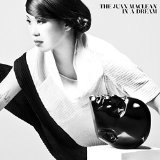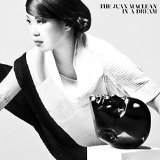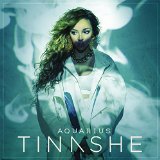An archetypal indie band of the type you hear less and less these days, Hospitality’s second album is a masterful example of restraint, space and structure. Instrumentals, vividly detailed middle eights and trumpet solos are all given ample breathing space. Never too precise or self -indulgent, Amber Papini sounds like a fallen it-girl spending her days and nights on the phone smoking in coffee shops and crashing on other peoples’ sofa-beds. An album that reveals more with each listen, Hospitality are both old fashioned and forward-looking in their execution of guitar, drums and the occasional synth pop.
SZA, Kelela and Kindness have all been responsible for building the momentum of the new slowed-down and sonically screwed with RnB genre that came out of the remains of classic Aaliyah and Brandy and Cassie’s massively influential and singular debut. All commendable in the own right, none of these have yet mastered the all essential ingredient of delectable and persistent melodies like Tinashe has on her sublime debut album, the most consistent and important RnB album from a female vocalist in the last couple of years.
 Azealia Banks – “Broke With Expensive Taste”
Azealia Banks – “Broke With Expensive Taste”
Her own worst enemy at times, but maybe that makes more sense now “Broke with Expensive Taste” has finally arrived in one piece and in the way Banks wanted it to. ‘I try all the cultures’ she sings over the appropriately tight and popping “Soda” and indeed she does; soca, hip-house, trap, surf-rock, UK garage and very deep house music all feature. The link to all of these styles is Banks herself; her inability to compromise and her keen ear have ensured her debut is one of the best within the genre, whatever genre that may be.
 The Juan Maclean – “In A Dream”
The Juan Maclean – “In A Dream”
It’s hard not to mentally tick off the many influences that bubble up whilst listening to The Juan Maclean’s third album. Dance and club music is unavoidably indebted to its past, there are over five decades of a rich, diverse history to get lost in but McLean wisely avoids pastiche and nostalgia and creates his own nocturnal fantasy. With the essential Nancy Wang’s deadpan disco queen vocals dominating two thirds of the album, the duo have created their most successful and exciting collection to date.
Not quite her masterpiece, so far that honour still falls upon 2011’s ground-breaking “Strange Mercy”. Annie Clarke’s first self-titled album is, following eleven months of getting-to-know-you time, probably her most strange and artful release so far. The original conceit is that it was going to be her most accessible and ‘pop’ album to date and yes, one of the songs does sound like a classic Madonna ballad. But tracks that start off as off-colour, other-worldly RnB end up somewhere completely unrelated, bruised and bashed 3 minutes later – and it works beautifully. A genuine superstar, St Vincent’s ‘St Vincent’ is one of the year’s brightest and most brutal releases.
 ‘Flights, in the night’ sings Nancy Whang conspiratorially during a quiet portal in the impressively detailed “A Place Called Space” that opens The Juan Maclean’s third album proper. Nothing sums up Whang and Maclean’s manifesto quite as perfectly as that line. Alluding to a retro glamour which no longer exists and a promise of a decadent and clandestine other world where the only light is artificial and strobing. This line, better still if it were morphed into a song title, could have been uttered on any number of Donna Summer’s tracks which featured on her most essential, electronic and nocturnal albums made between 1977- 1979 and produced by Giorgio Moroder. As if to hammer this point home Whang has simultaneously released an EP under her own name which is a collection of Casablanca records cover versions, it includes a faithful interpretation of Summer’s slippery and melancholic “Working the Midnight Shift”. “In A Dream” is a record that may wear its influences heavily on its sleeve but the cluster of magnificent songs and the vocal dynamics honed between the two prevents it from falling into a potentially deep hole of nostalgia and tribute.
‘Flights, in the night’ sings Nancy Whang conspiratorially during a quiet portal in the impressively detailed “A Place Called Space” that opens The Juan Maclean’s third album proper. Nothing sums up Whang and Maclean’s manifesto quite as perfectly as that line. Alluding to a retro glamour which no longer exists and a promise of a decadent and clandestine other world where the only light is artificial and strobing. This line, better still if it were morphed into a song title, could have been uttered on any number of Donna Summer’s tracks which featured on her most essential, electronic and nocturnal albums made between 1977- 1979 and produced by Giorgio Moroder. As if to hammer this point home Whang has simultaneously released an EP under her own name which is a collection of Casablanca records cover versions, it includes a faithful interpretation of Summer’s slippery and melancholic “Working the Midnight Shift”. “In A Dream” is a record that may wear its influences heavily on its sleeve but the cluster of magnificent songs and the vocal dynamics honed between the two prevents it from falling into a potentially deep hole of nostalgia and tribute.
If their 2005 debut album was an accurate record of the post-electro clash, nihilistic and disco-damaged DFA early days and the follow up and homage of sorts to British synth pop and handbag house then this record is where the pair decide to reach back even further. There has always been a vivid and brattish clutch of songs that have been hard to ignore in The Juan Maclean’s back catalogue, screaming and shouting for attention and not fully formed. “In A Dream” has eliminated these kinds of distractions and is all the better for it; Nancy Whang is afforded full vocals on six of the nine tracks here and is having a ball in the process. Her voice is not that of a disco diva although frequently this is precisely what the sonics would appear to dictate. It has a flat and disinterested quality and still, somehow, considerable charisma, and Whang can interchange between dismal, withering betrayal and a warm optimism that dominates for example the gradually unfurling and uplifting ten minute closing track “The Sun Will Never Set on Our Love”. Tellingly this is their first album to feature just Nancy Whang as the cover artist, overshadowing a metallic bust of a physically absent Maclean.
“You Were a Runaway” has a choppy and to-the-point Grace Jones type pop structure. “Running Back To You” with its gorgeously padding synth swirls and reference to Imagination’s slinking 1980 hit “Body Talk” is the album’s only mid-tempo song and sees Whang softened but not entirely submissive. “Love Stops Here”, which may have the album’s strongest melody, puts Maclean upfront and sounds like a very good LCD Soundsystem song with washes of New Order guitar along with Whang’s glorious ‘do do do’ refrain popping up for the very last moments. “I’ve Waited for so Long” is a tight and confrontational “Don’t You Want Me”- styled trade-off between the two vocalists. It borrows the bassline from Cerrone’s “Supernature” but like so much of the material here the duo detail and layer the soundscape to the point where it isn’t pilfering but perfecting a sound that is, within the confines of this album, completely theirs.
Two of the most complete and satisfying songs, the aforementioned Moroder-indebted “A Place Called Space” and the penultimate track “A Simple Design”, both featuring a dominant Whang vocal, see The Juan Maclean finally solidify an effortless and endearing personality. Since “Less Than Human” the couple have spent a decade attempting to gel in a way that allows them both to share the lead, a hard feat indeed as Whang is not just a ‘front woman’ and neither is Maclean an invisible producer in the mould of, say, Goldfrapp. With Maclean cast in the role of an outsider and a muted and occasional vocalist to boot, you feel that he is now happier to concentrate on perfecting the world that surrounds the two and less inclined to push his voice to the front in a way that has read as self-conscious before. It is impossible to imagine him for example delivering the stand-off line ‘time after time, when what you’re hoping to find is not a simple design but a headache!’ from “A Simple Design” with the same brutish gusto as Whang does. Both roles are of equal importance and “A Place Called Space” sees The Juan Maclean arrive at their ultimate destination; confident, possessed and prepared to share it with us. We should think ourselves lucky.





